新概念英语99课讲义
- 格式:doc
- 大小:33.00 KB
- 文档页数:5
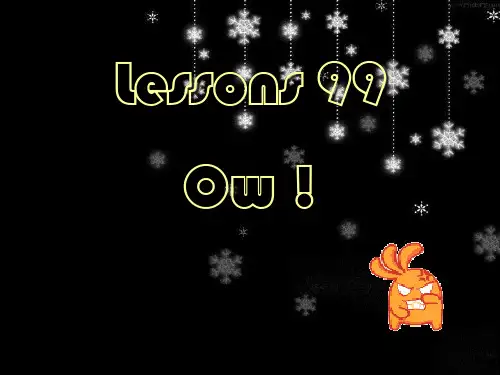
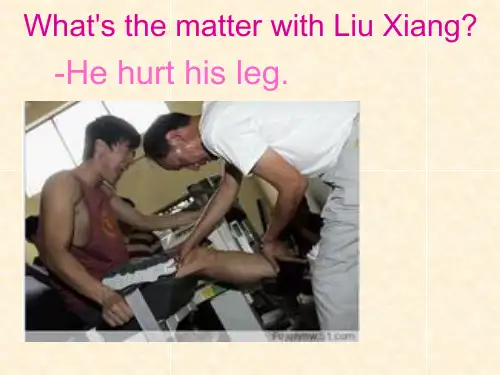
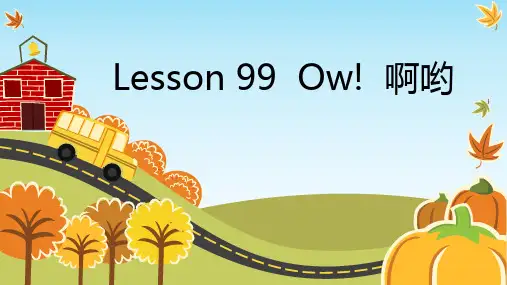
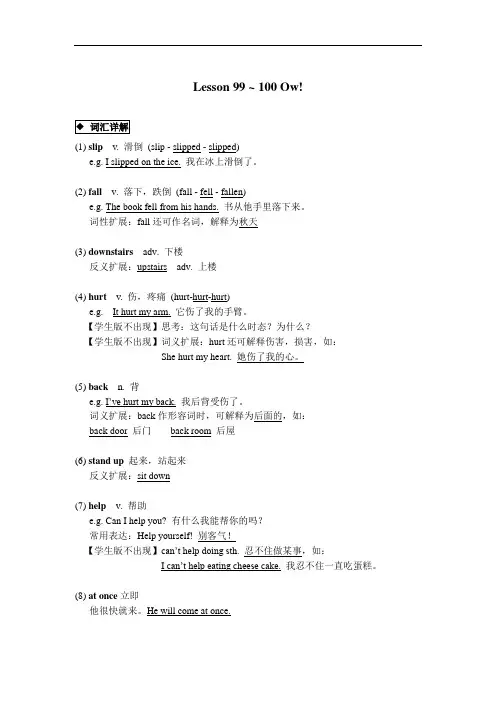
Lesson 99 ~ 100 Ow!(1) slip v. 滑倒(slip - slipped - slipped)e.g. I slipped on the ice. 我在冰上滑倒了。
(2) fall v. 落下,跌倒(fall - fell - fallen)e.g. The book fell from his hands. 书从他手里落下来。
词性扩展:fall还可作名词,解释为秋天(3) downstairs adv. 下楼反义扩展:upstairs adv. 上楼(4) hurt v. 伤,疼痛(hurt-hurt-hurt)e.g. It hurt my arm. 它伤了我的手臂。
【学生版不出现】思考:这句话是什么时态?为什么?【学生版不出现】词义扩展:hurt还可解释伤害,损害,如:She hurt my heart. 她伤了我的心。
(5) back n. 背e.g. I’ve hurt my back.我后背受伤了。
词义扩展:back作形容词时,可解释为后面的,如:back door 后门back room 后屋(6) stand up 起来,站起来反义扩展:sit down(7) help v. 帮助e.g. Can I help you? 有什么我能帮你的吗?常用表达:Help yourself! 别客气!【学生版不出现】can’t help doing sth. 忍不住做某事,如:I can’t help eating cheese cake.我忍不住一直吃蛋糕。
(8) at once立即他很快就来。
He will come at once.(9) sure adj. 一定的,确信的同义扩展:of course = certainly= absolutely【学生版不出现】Try and stand up. Can you stand up? Here. Let me help you.●语法:let为使役动词,意为“让,使”,常用于“let sb. do sth.”结构。
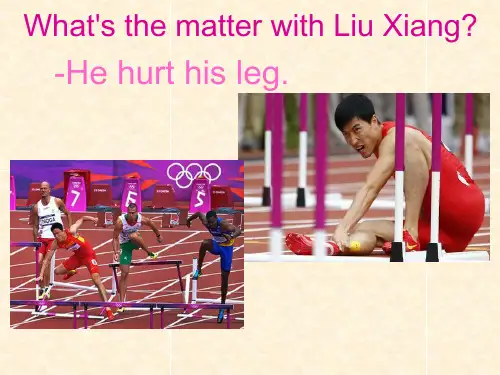
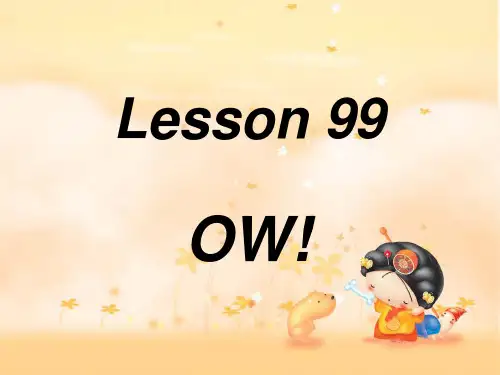
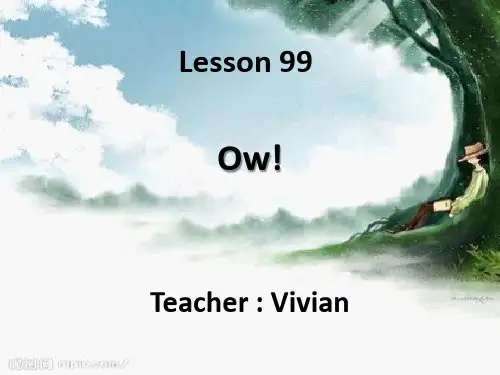
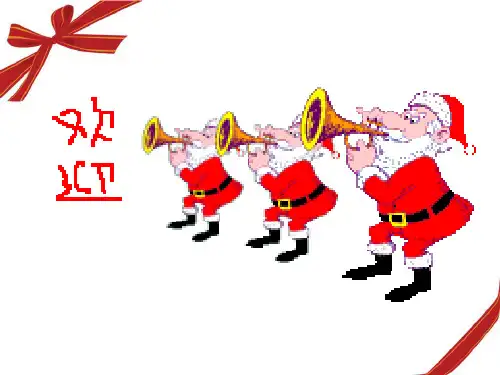
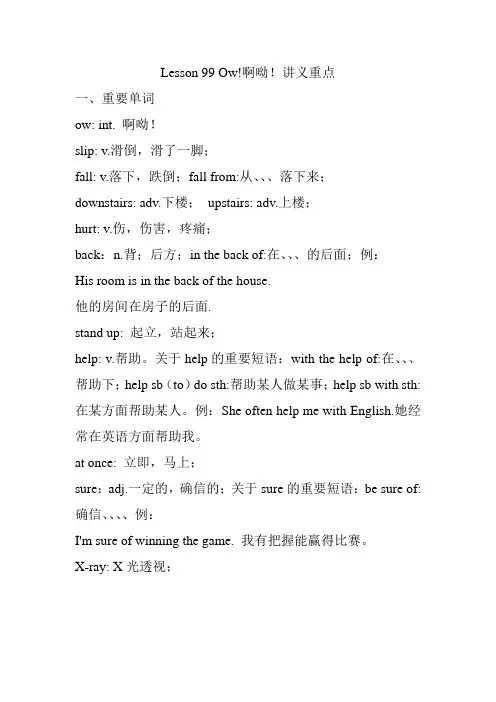
Lesson 99 Ow!啊呦!讲义重点一、重要单词ow: int. 啊呦!slip: v.滑倒,滑了一脚;fall: v.落下,跌倒;fall from:从、、、落下来;downstairs: adv.下楼;upstairs: adv.上楼;hurt: v.伤,伤害,疼痛;back:n.背;后方;in the back of:在、、、的后面;例:His room is in the back of the house.他的房间在房子的后面.stand up: 起立,站起来;help: v.帮助。
关于help的重要短语:with the help of:在、、、帮助下;help sb(to)do sth:帮助某人做某事;help sb with sth:在某方面帮助某人。
例:She often help me with English.她经常在英语方面帮助我。
at once: 立即,马上;sure:adj.一定的,确信的;关于sure的重要短语:be sure of:确信、、、、例:I'm sure of winning the game. 我有把握能赢得比赛。
X-ray: X光透视;二、重要短语句型既知识点1、What is the matter?怎么了?这是新概念英语中屡次出现的一个知识点,可单独使用也可跟with一起联合使用,掌握以下三点即可:①单独使用时相当于汉语的“怎么了”例:What is the matter?怎么了?I lost my keys. 我钥匙丢了。
②What is the matter with:、、、、怎么了?What is the matter with the machine?这台机器怎么了?③What is wrong with:、、、怎么了?What is wrong with you?你怎么了?2. I am afraid that I can not get up.对不起,我恐怕站不起来。
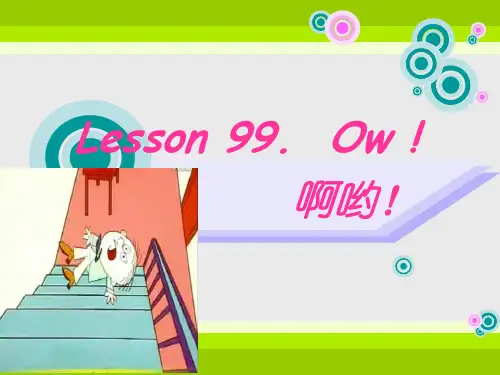
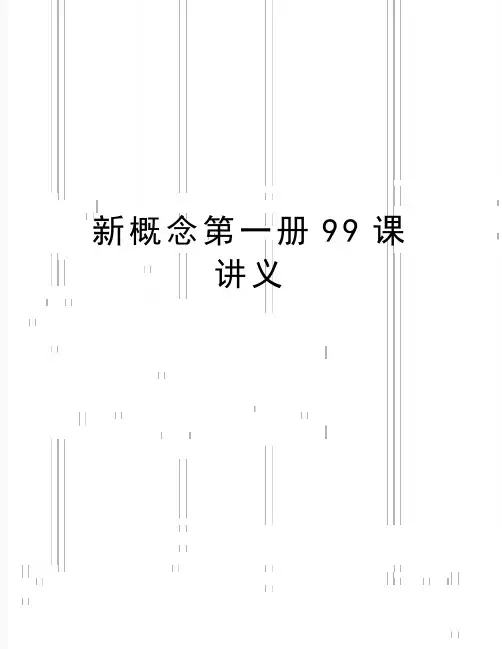
新概念第一册99课讲义新概念1 Lesson 99一、重点词汇:fall; downstairs; hurt; back; stand up; help; at once; sure二、重点句型:1.Have you hurt yourself?2.I think that I’ve hurt my back.3.I’m afraid that I can’t get up.4.I think that the doctor had better see you.5.The doctor says that he will come at once.6.I’m sure that you need an X-ray, Andy.三、知识点:1.What’s the matter? = What’s wrong?=What’s the trouble?2.downstairs upstairs3.hurt4.let sb. do sth. 让某人做某事5.had better do sth. 最好做某事(建议)6.had better not do sth. 最好别做某事(建议)7.phone sb.=call sb.=ring sb.up=telephone sb. 给某人打电话8.at once= right away=in a minute 立刻9.sure 确信,有把握的10.need 需要四、语法1.间接引语引述某人的话一般采用两种形式:一种是直接引语,即原封不动地引用原话,把它放在引号内;另一种是间接引语,即用自己的话加以转述,被转述的内容不放在引号内。
陈述句的间接引语直接引语是陈述句,变为间接引语时,在多数情况下都构成一个that引导的宾语从句,引述动词通常是say, tell等。
与此同时,间接引语中的人称、时态和其他方面也要相应有所变化。
Lucy: I think that the doctor had better see you.→ Lucy says that she thinks that the doctor had better see you. The doctor: I will come at once.→ The doctor says that he will come at once.2.宾语从句由一个句子充当宾语的从句称之为宾语从句。
Lesson 99 Ow!啊呦!讲义重点
一、重要单词
ow: int. 啊呦!
slip: v.滑倒,滑了一脚;
fall: v.落下,跌倒;fall from:从、、、落下来;downstairs: adv.下楼;upstairs: adv.上楼;
hurt: v.伤,伤害,疼痛;
back:n.背;后方;in the back of:在、、、的后面;例:
His room is in the back of the house.
他的房间在房子的后面.
stand up: 起立,站起来;
help: v.帮助。
关于help的重要短语:with the help of:在、、、帮助下;help sb(to)do sth:帮助某人做某事;help sb with sth:在某方面帮助某人。
例:She often help me with English.她经常在英语方面帮助我。
at once: 立即,马上;
sure:adj.一定的,确信的;关于sure的重要短语:be sure of:确信、、、、例:
I'm sure of winning the game. 我有把握能赢得比赛。
X-ray: X光透视;
二、重要短语句型既知识点
1、What is the matter?怎么了?
这是新概念英语中屡次出现的一个知识点,可单独使用也可跟with一起联合使用,掌握以下三点即可:
①单独使用时相当于汉语的“怎么了”例:
What is the matter?怎么了?
I lost my keys. 我钥匙丢了。
②What is the matter with:、、、、怎么了?
What is the matter with the machine?
这台机器怎么了?
③What is the wrong with:、、、怎么了?
What is the wrong with you?
你怎么了?
2. I am afraid that I can not get up.
对不起,我恐怕站不起来。
在本句中需要掌握的是afraid的用法,afraid是英语中一个重要的单词,初中阶段重点掌握以下三种用法:
①be afraid of sth:后接人或事物的名词,表示“害怕某人或某物”。
例如:
Are you afraid of dogs? 你害狗吗?
I am afraid of snack.我害怕蛇。
②be afraid to do sth:表示“因害怕而不敢做某事”,例:
He was afraid to fly in a plane. 他不敢坐飞机。
I am afraid to listen to the ghost story.我不敢听鬼故事。
③be afraid + that从句表示“担心……”例如:
He is afraid that she will not come. 他担心她不会来
I am afraid that I can not agree with you.
恐怕我不能同意你的意见
3. I think that the doctor had better see you.
我想最好请医生来给你看一下
在本句中我们需要复习与巩固一下had better的用法:
①had better经常略写为’d better,后面必须跟动词原形,这里的had不能用have来替换;例:
You had better go with us.
你最好跟我们一起走。
②不论主语是第几人称,句子是什么时态,都要用had better 的形式;例:She had better keep quiet in the library.
在图书馆她最后保持安静。
③had better的否定形式是:在had better后面直接加not;You had better not play in the street.
你最好不要在街上玩耍。
三、重要语法:冠词的用法
冠词在英语中主要有三个:a/an/the,这三个冠词被分成两类,其中a/an属于不定冠词,不定冠词a/an表示“一”“一个”
的意思,通常用在可数名词的单数形式前,the属于定冠词,表示特指。
不定冠词a/an的用法:
①an只用在以元音音标开头的单词前,例:
It is an umbrella. 它是一把雨伞。
That is an old car. 那是一辆旧车。
This is an American car.这是一辆美国车。
Here is an Italian car.这是一辆意大利车。
②其它情况下表示“一”这个概念用a,例:
This is a nice handbag.这是一个不错的手提包。
It is a Japanese car.它是一辆日本车。
Lily is a good student.莉莉是个好学生。
定冠词the的用法:
①特指双方都明白的人或物:
The book is on the table:这本书在桌子上。
She is the nurse:她就是那个护士。
②指代上文提到过的人或事:
There is a coat on the bed. The coat is Tom′s.
床上有一件大衣。
那件大衣是汤姆的。
There is a cup on the table. The cup is empty.
桌子上有一个杯子。
杯子是空的。
③指世界上独一无二的事物:
The sun is very bright.太阳很明亮。
The sky is blue.天空是蓝色的。
The earth is my home.地球是我的家。
④用于单数名词前表示一类人或事物:
The horse is a useful animal. 马是有用的动物。
The apple is a kind of fruit. 苹果是水果的一种。
⑤用于形容词最高级前:
Who is the tallest student here?谁是这里最高的孩子?Winter is the coldest season of the year。
冬天是一年中最冷的季节。
⑥用于姓氏复数形式前,表示一家人
The Browns are kind to us. 布朗一家人对我们很好。
The Greens are having dinner.格林一家人正在吃饭。
⑦乐器前需加the,球类前省略the:
She is playing the piano.她正在弹钢琴。
Tom is playing basketball.汤姆正在打篮球。